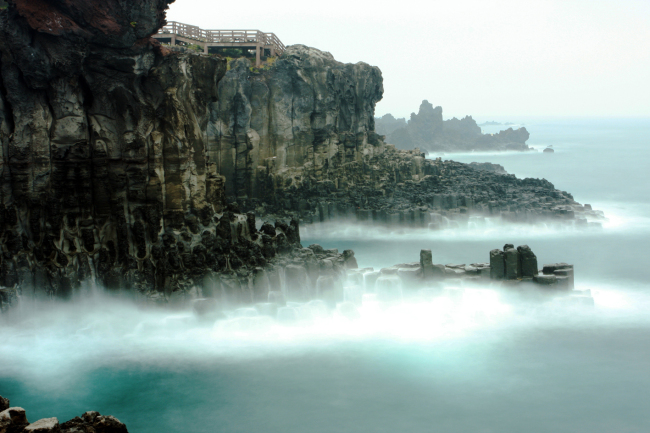Jejudo Island has been the country’s most popular vacation spot due to its scenic beauty and peaceful serenity, but beyond the brief respite from the hustle and bustle of urban life, more and more people from outside have opted to settle down there.
From photographers to businesspeople and patients seeking natural healing, newcomers are enjoying the benefits of residing on the island that boasts clean water, refreshing sea winds, tropical plants and basalt rocks, all of which combine to create the uniquely exotic ambience.
Infatuated with the vibrant landscape of the island, Jang Seon-woo, a 60-year-old movie director, moved to Jejudo Island with his wife some nine years ago. Unlike other isolated islands, Jejudo has never left him bored, providing him with ample fodder for movie scenarios.
 |
The Jusangjeolli Cliffs, at the southern coast of Jejudo Island, offer a rare glimpse into the stunning volcanic rock formations of hexagonal columns, one of the scenic sites showcasing the island’s natural beauty. |
“Jejudo has indescribably attractive features. It has an environment that is calm in some way, but also dynamic and rough, if you look at the peaceful mountains here and the sea waves whose shapes change constantly,” he said.
“I am quite surprised myself that I have lived here for this long, given that I am a kind of person who travels a lot and gets easily bored. I initially thought I would stay here just two to three years, to be honest.”
When it comes to happiness, Jang has two images in his mind: A man resting under the shade of a palm tree with an assortment of local delicacies and a lovely spouse, and a care-free monk dozing off in a peaceful temple tucked in a tranquil mountain.
“Jejudo has both images that I have been so eagerly craving,” he said.
The number of people moving to Jejudo has increased in recent years, according to data from the Jeju Special Self-Governing Province office. Including new foreign residents, the number of island newcomers stood at 6,097 in 2011, rose to 9,165 in 2012 and 12,221 last year. The total population of the island is currently around 615,900.
For Kang Chung-sea, a 65-year-old photographer, Jejudo Island was the perfect healing place. While suffering from heart disease some three years ago, he decided to move to Jejudo from Daegu. With fresh water and air, not to mention the beautiful landscape, he slowly recovered from his illness.
“I travel to Daegu from time to time to meet my family there. But I soon feel uncomfortable and sick. But here on Jejudo, I feel very healthy and safe,” he said.
“While taking a stroll, riding a bicycle, fishing, photographing and doing other leisure activities, my life has become very wholesome by any standard. It has truly become my lovely second hometown ― a reason why I want to recommend people come here and live.”
To live up to the increasing expectations for a clean environment, the provincial government is pushing its “carbon-free vision” to minimize carbon emissions through generating wind power; establishing a smart grid infrastructure for energy efficiency; promoting the use of electronic vehicles and boosting clean energy industries.
The provincial office’s relentless environmental efforts have earned Jejudo Island international recognition for its natural assets.
In 2011, the island was voted one of the new seven wonders of nature in an international poll conducted by the New7Wonders Foundation, a nonprofit organization based in Zurich. UNESCO also designated it a “biosphere reserve” in 2002 and added it to the list of World Natural Heritage Sites in 2007. Last year, the U.S. cable news channel CNN introduced Jejudo Island as Asia’s new best weekend getaway.
Refusing to rest on its laurels as the top tourist destination, the island has also been striving to turn itself into a magnet for investors and new businesses with residential benefits, deregulatory measures and other incentives.
In particular, the island has adopted an immigration program under which a real estate investor from overseas who invests 500 million won ($480,000), or more is given an F-2 residency visa, and then an F-5 permanent residency visa five years later. After the program began in 2010, the island secured investment worth 851.6 billion won from new immigrants.
The island also aims to become a major hub for quality education and advanced medical treatment, as it pushes to bring in foreign hospitals and top-notch international schools for English education.
By Song Sang-ho (
sshluck@heraldcorp.com)








